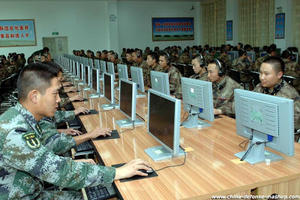China syndromeU.S.: China orchestrating broad cyberattack campaign against U.S.
The Obama administration accused China’s military of orchestrating a campaign of cyberattacks against American government computer systems and defense contractors for the purpose of identifying “military capabilities that could be exploited during a crisis.” Cyber experts estimate that about 90 percent of all cyberattacks in the United States originate in China, but these estimates have typically been offered by private-sector experts. The Pentagon’s annual report to Congress, released Monday, is the first government document specifically and explicitly to assert that the People’s Liberation Army (PLA) is behind a sustained, systematic campaign of cyberattacks on the United States in an effort to gain a strategic advantage over the United States. The report also pointedly notes that Chinese investments in U.S. companies aim to help this cyberattacks campaign.

China has initiated a large scale cyberattack on U.S. interests // Source: freeweibo.com
The Obama administration accused China’s military of a campaign of cyberattacks on American government computer systems and defense contractors for the purpose of identifying “military capabilities that could be exploited during a crisis.”
The New York Times reports that cyber experts estimate that about 90 percent of all cyberattacks in the United States originate in China, but these estimates have typically been offered by private-sector experts.
The Pentagon’s annual report to Congress is the first government document specifically and explicitly – and publically — to assert that the People’s Liberation Army (PLA) is behind a sustained, systematic campaign of cyberattacks on the United States in an effort to gain a strategic advantage.
“In 2012, numerous computer systems around the world, including those owned by the U.S. government, continued to be targeted for intrusions, some of which appear to be attributable directly to the Chinese government and military,” the nearly 100-page report stated.
The report says China’s goals in the attacks were stealing industrial technology and gaining better understanding of American policy makers’ thinking. The report said the attacks could be used for “building a picture of U.S. network defense networks, logistics, and related military capabilities that could be exploited during a crisis.”
The report also details China’s efforts to bolster its offensive cyber warfare capabilities. These capabilities will allow China to blind American satellites and push the U.S. military presence back toward the mid-Pacific.
The Chinese do not make a secret of their effort to integrate cyberwarfare into their overall military strategy, and the report cites two published Chinese military manuals, “Science of Strategy” and “Science of Campaigns,” saying both identify “information warfare (I.W.) as integral to achieving information superiority and an effective means for countering a stronger foe.”
Neither document, however, “identifies the specific criteria for employing a computer network attack against an adversary,” though they “advocate developing capabilities to compete in this medium.”
The report also pointedly notes that China’s broad campaign of cyberattacks against U.S. government organizations and private companies is helping by Chinese investments in U.S. companies. “China continues to leverage foreign investments, commercial joint ventures, academic exchanges, the experience of repatriated Chinese students and researchers, and state-sponsored industrial and technical espionage to increase the level of technologies and expertise available to support military research, development and acquisition,” the report says.
The report notes that there is a debate in the higher echelons of China’s leadership about the country’s strategy. One school emphasizes the need to concentrate on addressing China’s mounting domestic problems. “[P]roponents of a more active and assertive Chinese role on the world stage… have suggested that China would be better served by a firm stance in the face of U.S. or other regional pressure.”
